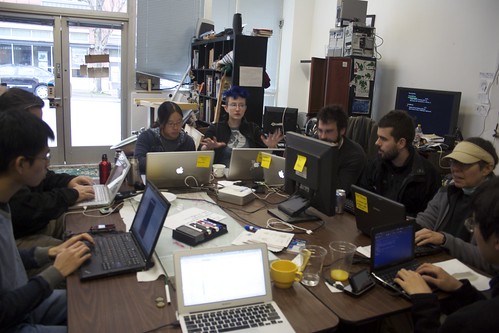The Random Hacks of Kindness at International Conference of Crisis Mappers took place this past weekend (October 13 – 14, 2012) at George Washington University in Washington, DC. Humanitarian hackathons are specialized in that the hacks proposed are brought by subject matter experts who fully understand the needs and impact of a tool built out during the event. While not all events curate their challenges, we did at this one, with the esteemed team comprised of The Doctor, Robbie Mackay, Jen Ziemke, Heather Leson, Kate Chapman and Willow Bl00. They examined each of the 16 proposed challenges for usefulness, if it could be accomplished over the weekend, technical specs and feasibility, as well as strong use case. Our 40 participants piled into our tiny room to work on the 7 of selected challenges. 5 presented on Sunday afternoon.
Many thanks to our sponsors AT&T Developer Program and John Carroll University. Thanks to you, we had essential coffee, delicious food, candy and steady internet tubes. We were also able to award prizes to each of the teams.
James with Amnesty International worked on Challenge #8 : Geographic Web Data Curation Tool with Nico from InSTEDD. This collaboration made me happy for two main reasons – one was that they were able to address James’s challenge with an existing tool. The second reason is that James, who came with little coding experience, took the weekend to learn about RIff and apply it to his problem space. There is a distinct issue in the digital humanitarian community of “Wasn’t Built Here” which adds to the already massive cognitive load of the responders.Extending an existing tool means we can keep using what works while making it better.
Clay and Jorge (Challenge #13: Mapping United Nations Security Council Resolutions) implemented MapBox by porting in UN Policies and geocoding them to the areas they were based around, matching a geospatial and temporal interface to search the resolutions issued by the United Nations Security Council. A quick way to see where the UN had been focusing, along with an easy pull on the referenced documents, this creates another way for people to search and catalog.
The Taarifa team linked up to a group in England to create the hardware trigger for a data snapshot from just about any input, along with the API call which would link up to that snapshot. A continuing hack from H4D2 (and other hackathons), we were pleased as punch to see this group working hard to see their platform for civic reporting push forward and build out their contributing community.
A subtle but powerful glue was created by Josh Snider while working on Challenge 15: Extracting info into SMS reports. A user could send in a text which would port directly into a wiki and geocode. If formatted incorrectly, a text is returned to the person asking them to reformat. The potential of messaging format issues could assist in the accuracy of content collected to so support digital humanitarians in processing massive amounts of incoming texts into maps.
Best overall hack went to the Humanitarian Markup Language (HXL) team, a challenge brought to the table by UN OCHA’s CJ Hendrix. It furthered the capabilities of this platform by doing creating an easy way to interact with maps, with special care payed to the visualization and interface – be still my linux-loving-mac-using heart. It eases the process of grabbing maps, uploading maps, and plugging them into what you need.Huge thanks again to our sponsors, and to the ICCM team Jen and Patrick for organizing the event our hackathon went hand-in-hand with. A special sparkle kittens to Heather Leson of Ushahidi for co-organizing and facilitating the event. I’ll match my blue hair to your pink hair anytime.
RHOK and ICCM share common goals of uniting the brightest minds for sprints of collaboration. This was the first time that RHOK occurred at ICCM. It was amazing to have guest subject matter experts join the hackathon to share their expertise with the talented developers and challenge owners. This is a huge opportunity to keep the momentum. A number of the challenges will continue on to RHOK Global in December. Willow and Heather will work with the folks to mentor their efforts. As well, based on the success of ICCM RHOK, we recommend that ICCM in Nairobi also have a simultaneous RHOK.


